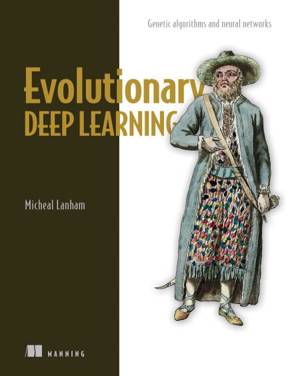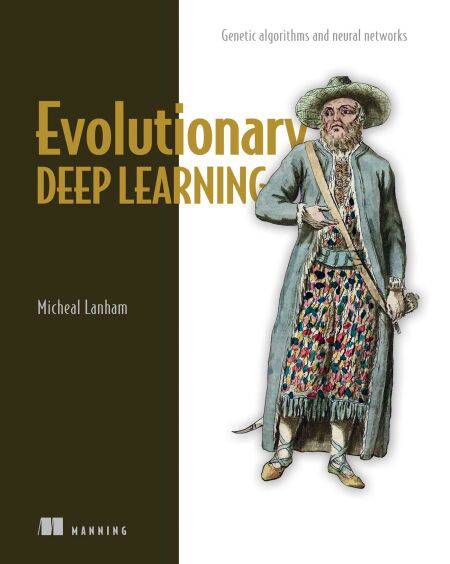
- Afhalen na 1 uur in een winkel met voorraad
- Gratis thuislevering in België vanaf € 30
- Ruim aanbod met 7 miljoen producten
- Afhalen na 1 uur in een winkel met voorraad
- Gratis thuislevering in België vanaf € 30
- Ruim aanbod met 7 miljoen producten
Zoeken
Evolutionary Deep Learning E-BOOK
Genetic algorithms and neural networks
Micheal Lanham
E-book | Engels
€ 49,20
+ 49 punten
Uitvoering
Omschrijving
Discover one-of-a-kind AI strategies never before seen outside of academic papers! Learn how the principles of evolutionary computation overcome deep learning’s common pitfalls and deliver adaptable model upgrades without constant manual adjustment.
In Evolutionary Deep Learning you will learn how to:
Solve complex design and analysis problems with evolutionary computation Tune deep learning hyperparameters with evolutionary computation (EC), genetic algorithms, and particle swarm optimization Use unsupervised learning with a deep learning autoencoder to regenerate sample data Understand the basics of reinforcement learning and the Q-Learning equation Apply Q-Learning to deep learning to produce deep reinforcement learning Optimize the loss function and network architecture of unsupervised autoencoders Make an evolutionary agent that can play an OpenAI Gym game
Evolutionary Deep Learning is a guide to improving your deep learning models with AutoML enhancements based on the principles of biological evolution. This exciting new approach utilizes lesser-known AI approaches to boost performance without hours of data annotation or model hyperparameter tuning. In this one-of-a-kind guide, you’ll discover tools for optimizing everything from data collection to your network architecture.
About the technology
Deep learning meets evolutionary biology in this incredible book. Explore how biology-inspired algorithms and intuitions amplify the power of neural networks to solve tricky search, optimization, and control problems. Relevant, practical, and extremely interesting examples demonstrate how ancient lessons from the natural world are shaping the cutting edge of data science.
About the book
Evolutionary Deep Learning introduces evolutionary computation (EC) and gives you a toolbox of techniques you can apply throughout the deep learning pipeline. Discover genetic algorithms and EC approaches to network topology, generative modeling, reinforcement learning, and more! Interactive Colab notebooks give you an opportunity to experiment as you explore.
What's inside
Solve complex design and analysis problems with evolutionary computation Tune deep learning hyperparameters Apply Q-Learning to deep learning to produce deep reinforcement learning Optimize the loss function and network architecture of unsupervised autoencoders Make an evolutionary agent that can play an OpenAI Gym game
About the reader
For data scientists who know Python.
About the author
Micheal Lanham is a proven software and tech innovator with over 20 years of experience.
Table of Contents
PART 1 - GETTING STARTED
1 Introducing evolutionary deep learning
2 Introducing evolutionary computation
3 Introducing genetic algorithms with DEAP
4 More evolutionary computation with DEAP
PART 2 - OPTIMIZING DEEP LEARNING
5 Automating hyperparameter optimization
6 Neuroevolution optimization
7 Evolutionary convolutional neural networks
PART 3 - ADVANCED APPLICATIONS
8 Evolving autoencoders
9 Generative deep learning and evolution
10 NEAT: NeuroEvolution of Augmenting Topologies
11 Evolutionary learning with NEAT
12 Evolutionary machine learning and beyond
In Evolutionary Deep Learning you will learn how to:
Solve complex design and analysis problems with evolutionary computation Tune deep learning hyperparameters with evolutionary computation (EC), genetic algorithms, and particle swarm optimization Use unsupervised learning with a deep learning autoencoder to regenerate sample data Understand the basics of reinforcement learning and the Q-Learning equation Apply Q-Learning to deep learning to produce deep reinforcement learning Optimize the loss function and network architecture of unsupervised autoencoders Make an evolutionary agent that can play an OpenAI Gym game
Evolutionary Deep Learning is a guide to improving your deep learning models with AutoML enhancements based on the principles of biological evolution. This exciting new approach utilizes lesser-known AI approaches to boost performance without hours of data annotation or model hyperparameter tuning. In this one-of-a-kind guide, you’ll discover tools for optimizing everything from data collection to your network architecture.
About the technology
Deep learning meets evolutionary biology in this incredible book. Explore how biology-inspired algorithms and intuitions amplify the power of neural networks to solve tricky search, optimization, and control problems. Relevant, practical, and extremely interesting examples demonstrate how ancient lessons from the natural world are shaping the cutting edge of data science.
About the book
Evolutionary Deep Learning introduces evolutionary computation (EC) and gives you a toolbox of techniques you can apply throughout the deep learning pipeline. Discover genetic algorithms and EC approaches to network topology, generative modeling, reinforcement learning, and more! Interactive Colab notebooks give you an opportunity to experiment as you explore.
What's inside
Solve complex design and analysis problems with evolutionary computation Tune deep learning hyperparameters Apply Q-Learning to deep learning to produce deep reinforcement learning Optimize the loss function and network architecture of unsupervised autoencoders Make an evolutionary agent that can play an OpenAI Gym game
About the reader
For data scientists who know Python.
About the author
Micheal Lanham is a proven software and tech innovator with over 20 years of experience.
Table of Contents
PART 1 - GETTING STARTED
1 Introducing evolutionary deep learning
2 Introducing evolutionary computation
3 Introducing genetic algorithms with DEAP
4 More evolutionary computation with DEAP
PART 2 - OPTIMIZING DEEP LEARNING
5 Automating hyperparameter optimization
6 Neuroevolution optimization
7 Evolutionary convolutional neural networks
PART 3 - ADVANCED APPLICATIONS
8 Evolving autoencoders
9 Generative deep learning and evolution
10 NEAT: NeuroEvolution of Augmenting Topologies
11 Evolutionary learning with NEAT
12 Evolutionary machine learning and beyond
Specificaties
Betrokkenen
- Auteur(s):
- Uitgeverij:
Inhoud
- Aantal bladzijden:
- 360
- Taal:
- Engels
Eigenschappen
- Productcode (EAN):
- 9781638352327
- Verschijningsdatum:
- 2/10/2023
- Uitvoering:
- E-book
- Beveiligd met:
- Adobe DRM
- Formaat:
- ePub

Alleen bij Standaard Boekhandel
+ 49 punten op je klantenkaart van Standaard Boekhandel
Beoordelingen
We publiceren alleen reviews die voldoen aan de voorwaarden voor reviews. Bekijk onze voorwaarden voor reviews.











